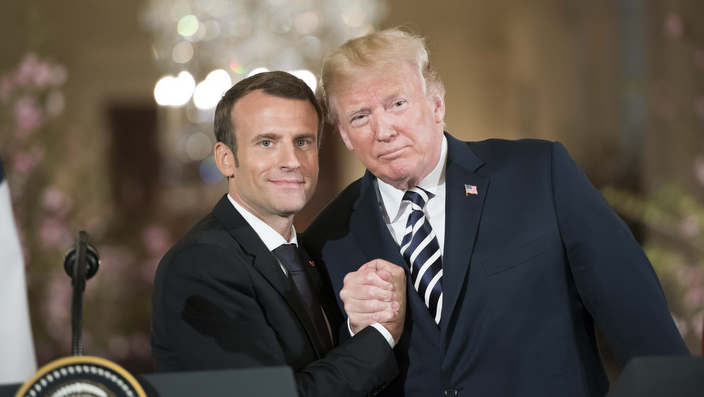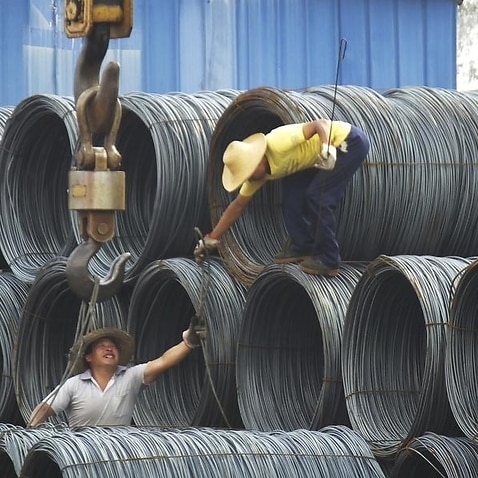Trade war looms as US allies respond to tariffs on steel, aluminium

READ MORE
The world’s largest economies stood at the precipice of all-out trade war on Thursday as major US allies announced retaliation against stinging steel and aluminum tariffs that are due to take effect in the coming hours.
President Donald Trump’s decision on Thursday not to extend exemptions for Canada and the European Union — the largest US sources of foreign aluminum and steel respectively — upended the agenda for talks among Group of Seven foreign ministers underway in Canada.
As Brussels, Ottawa and Mexico City vowed to impose counter-tariffs on billions in US goods, France said it would not negotiate while the tariffs were in effect, and lawmakers in Trump’s Republican Party denounced the move as threat to prosperity and global stock markets sank.
In a call late Thursday, French President Emmanuel Macron told Trump the tariffs were “illegal” and said Europe would respond in a “firm and proportionate manner.”

US Treasury Secretary Steven Mnuchin was likewise sure to receive an earful from his G7 counterparts at meetings in a coastal mountain resort in Canada, with raw differences dominating the atmosphere.
Normally the scene of compromise and trade promotion, the G7 meet took on an air of futility as hopes for dialogue all but vanished.

‘Economic nationalism’
“I’ll be stating very clearly our disagreement with the actions they’ve taken,” Canadian Finance Minister Bill Morneau told reporters.
“I have every expectation that our other allies around the table will express the same sentiments.”
Earlier Thursday Macron told journalists at the Elysee Palace that he deplored the American decision.
“I think this decision is a mistake in many ways because it responds to existing international imbalances in the worst way — by breaking up and creating economic nationalism.
“And nationalism is war. That’s exactly what happened in the 30s,” he added.
En route to the G7 meetings, French Finance Minister Bruno Le Maire said his country, and other European nations, would not negotiate while the sanctions were in effect.
“We cannot enter into any kind of discussion under the pressure,” Le Maire said.
The White House, however, said Thursday the tariffs first imposed in March — 25 percent duties on steel and 10 percent on aluminum — have had “major, positive effects on steel and aluminum workers and jobs.”
And the administration’s actions “underscore its commitment to good-faith negotiations with our allies to enhance our national security while supporting American workers.”
Commerce Secretary Wilbur Ross said talks with the EU had failed to convince Washington that it should continue exempting the trading bloc from the tariffs.
Washington also is removing exemptions for Mexico and Canada because negotiations to revise the 24-year-old North American Free Trade Agreement are “taking longer than we had hoped” and there is no “precise date” for concluding them, Ross said.
In response, Canada announced Can$16.6 billion (US$12.8 billion) in retaliatory duties on US goods, including potentially on beef, coffee, candies, plywood and surprisingly, maple syrup, as well as steel and aluminum.
Mexico said it would impose retaliatory duties on a variety of US goods, including steel and a host of agricultural goods, including pork, apples and various cheeses.
EU chief Jean-Claude Juncker said the 28-nation bloc “will announce in the next coming hours counter-balancing measures” in response to the US action.
Brussels previously threatened to slap tariffs on US products including bourbon, motorcycles and blue jeans, as well as other products.
Meanwhile, South Korea negotiated a steel quota, while Argentina, Australia and Brazil have arranged for “limitations on the volume they can ship to the US in lieu of tariffs,” according to Ross.
Despite weeks of talks with his EU counterparts, Ross said the United States was not willing to meet the EU demand to be “exempted permanently and unconditionally from these tariffs.”
Trump imposed the steel and aluminum tariffs using a national security justification, which Ross said encompasses a broad array of economic issues — a premise derided by US allies.

Ross said Trump was living up to his campaign promises.
Protecting technology is the key issue in the US trade dispute with China, which the White House said will face 25 percent tariffs on $50 billion in goods.
Ross said he planned to travel to Beijing Friday for further talks aimed at finding a solution to the trade friction.
The administration had said the China tariffs were on hold, but then reversed course this week and announced it was planning to go ahead with them after all.
Republican outcry
The US action prompted an outcry from Trump’s own Republican party, although metal industry groups expressed support.
“When it comes to unfairly traded steel and aluminum, Mexico, Canada, and Europe are not the problem — China is,” said Kevin Brady, chairman of the House Ways and Means Committee.
Republican Senator Ben Sasse was more blunt: “This is dumb.”
Global stock markets were not happy with the prospect of a trade war, with shares falling in London, Paris and Frankfurt, while Wall Street retreated from Wednesday’s short-lived recovery.
The benchmark Dow Jones Industrial Average closed down 1.0 percent.
Comments
Post a Comment